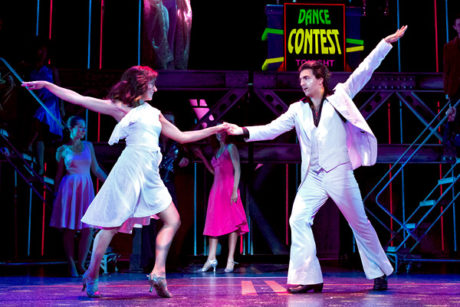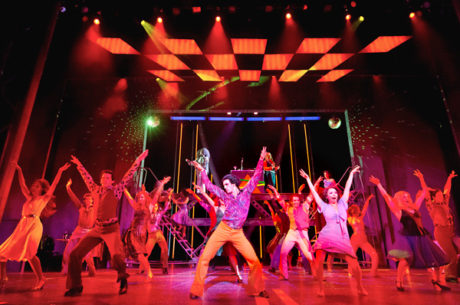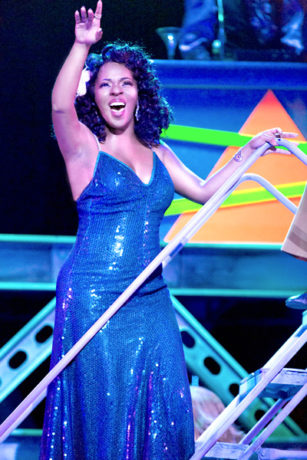What do you remember most about the movie Saturday Night Fever? Is it the dynamic direction, the earthy dialogue, or the gritty story about a working-class Brooklyn kid trying to escape a menial job at a paint store? I’m guessing it’s probably none of those things. No, you probably remember John Travolta in that white suit. Or the throbbing disco beat and falsetto harmonies of the Bee Gees. Or all that dancing. Heck, I was too young to get into R-rated movies like Saturday Night Fever in 1977, and even I remember those things – because they caused a sensation that permeated American pop culture for years.

The stage version of Saturday Night Fever, now playing at the Walnut Street Theatre, is clearly designed to appeal to its audience’s nostalgia for the disco era. And the best thing about it is the thing most people are coming to see: the dancing. Thanks to Richard Stafford’s choreography and John Daniels’ musical direction, numbers like “Stayin’ Alive,” “Night Fever” and “You Should Be Dancing” explode with energy and athleticism. Leaps, high kicks, and gyrations seem to come effortlessly to the hard-working ensemble. Jack Mehler’s pulsating lighting (including the requisite mirror balls) and the multicolored polyester clothing (designed by Michael Bottari and Ronald Case) add to the spectacle without being too garish. Peter Barbieri’s set design suggests Brooklyn with a minimum of flourishes.
Saturday Night Fever was first adapted for the stage in the late nineties, enjoying runs on Broadway and on London’s West End. But it’s been revised and rewritten multiple times, as producers have tried to perfect it. The current version features a book by Sean Cercone and David Abbinanti that uses large chunks of the dialogue from Norman Wexler’s screenplay. It sticks pretty closely to the movie’s general outline, though some of the subplots – the generational battles within hero Tony Manero’s family, the twin scourges of gang violence and ethnic tensions – get cut off just as they’re getting interesting. Under Stafford’s direction, most of the scenes are tedious and choppy, lasting just long enough to ease us into the next dance number.

Those dance numbers are mostly set to the hit songs from the movie, naturally. But the songs worked better in the movie because they served as background to the drama. Here, the actors get to sing the Bee Gees’ lyrics, most of which are not connected to the plot. (Why people in Brooklyn are singing “Nights on Broadway” is never explained.) As a result, when the actors open their mouths to sing, the story tends to come to a halt. Four new songs have been added, all written by co-scriptwriter Abbinanti, and they actually do flesh out the characters a bit. Unfortunately, they’re also generic, lacking the distinctive zest and craftsmanship the Bee Gees brought to their songs.
As Tony Manero, for whom disco dancing is a respite from a world where he doesn’t fit in – “When I’m dancing,” he says at one point, “I’m somebody” – Jacob Tischler is intense and aggressive; he doesn’t smile at all until he takes his bow at the curtain call. While he doesn’t have Travolta’s magnetism, he’s certainly a fine dancer (though considering the talent of the ensemble, he’s not the standout dancer Tony should be). There are sensitive performances (and superb singing) from the two women in Tony’s life – Alexandra Matteo as ambitious Stephanie, and Nicole Colón as needy Annette. Ben Dibble, virtually unrecognizable under sunglasses, shoulder-length hair and a goatee, gets to sing a few songs as the club deejay, while Crystal Joy, playing a club singer (a newly added character), elevates all her songs with vital emotion. And the supporting cast adds some reliable Brooklynese flavor, especially Sabrina Profitt and Fran Prisco as Tony’s distant and uncomprehending parents.
Saturday Night Fever is pleasant, but aside from its fantastic dance numbers, it never quite catches fire. Still, for anyone stuck in a lousy job like Tony Manero, or for anyone looking for a trip back to the days of their youth when dancing at the local disco on a Saturday night made the rest of the week bearable, Saturday Night Fever could be just the thing to get you dancing in the aisles.
Running Time: Two hours and 50 minutes, with an intermission.

Saturday Night Fever plays through July 16, 2017, at Walnut Street Theatre – 825 Walnut Street, in Philadelphia, PA. For tickets call (215) 574-3550, or purchase them online.




